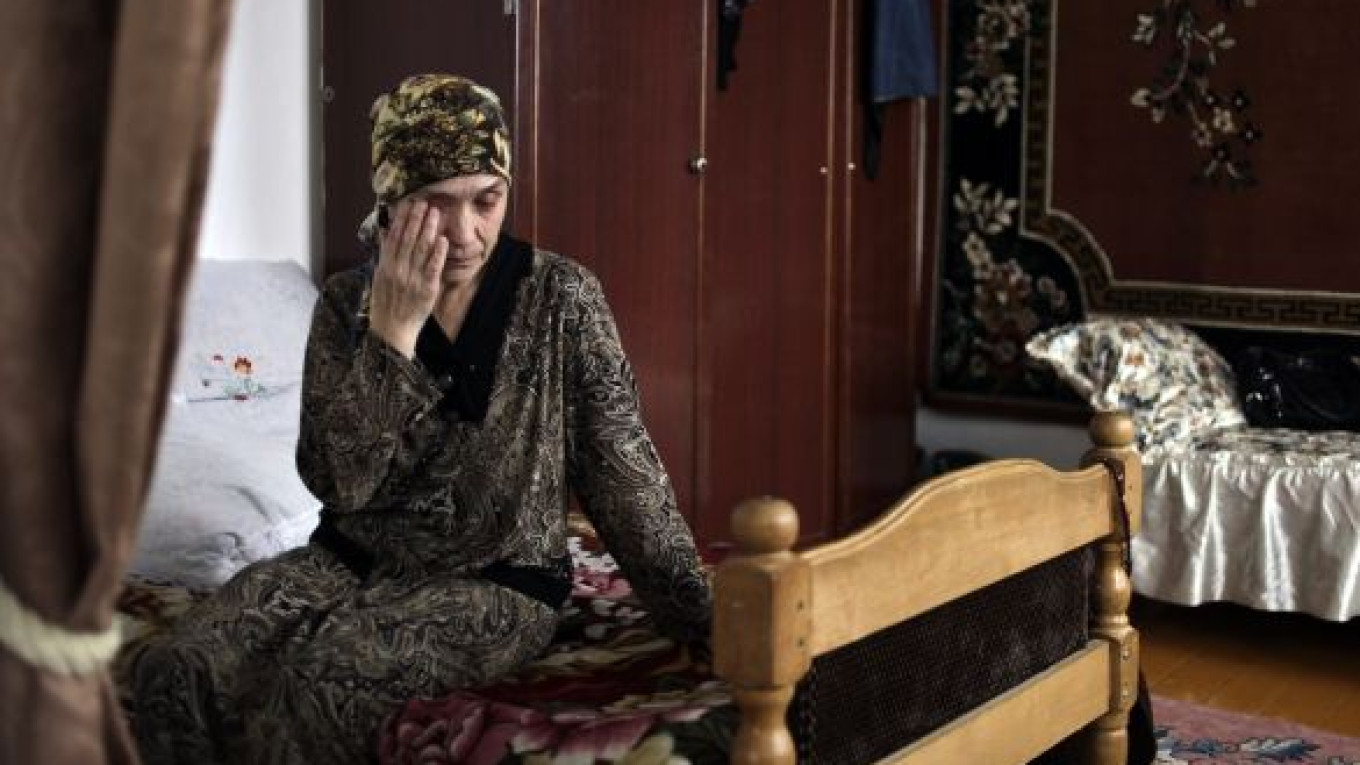ALI-YURT, Ingushetia — Speaking softly through tears in her family's tiny home in the North Caucasus, Roza Yevloyeva apologized for her son's suicide bomb attack on Russia's busiest airport 3 1/2 weeks ago.
Magomed Yevloyev, 20, detonated explosives strapped to his body at Moscow's Domodedovo airport on Jan. 24, killing 36 people. Analysts say the attack was proof the Kremlin has failed to quell a bubbling Islamist insurgency along its south.
"We commiserate, and we extend a very big apology to the whole world," Yevloyeva told Reuters on Wednesday in her first interview with foreign press in the town of Ali-Yurt in Ingushetia.
"We are so ashamed, so bitterly sad. We really worry for all the people who died, whom he wounded," the 54-year-old school teacher and mother of four said between muffled sobs as she perched on her dead son's wooden bed.
Islamist leader Doku Umarov, who said he ordered the attack, has since threatened a year of "blood and tears" before Russia's 2012 presidential elections, saying he has dozens of suicide bombers ready to unleash on Russian cities.
Styling himself as the Emir of the Caucasus, Umarov wants to create a separate state with sharia Islamic law across the Muslim republics of the North Caucasus that he considers to be "occupied" territory.
The robust insurgency in Ingushetia — a sliver of land next to Chechnya, the site of two post-Soviet separatist wars that underpin the militant movement — underscores the threat.
Magomed's brother Akhmed, 16, and his sister Fatima, 22, have now been arrested and taken to Moscow for questioning. His third sibling is physically disabled and does not leave the family home.
Authorities say Magomed's arrested siblings helped him prepare his bomb. Now, in the ramshackle family home, heated by a single wood-fired stove and decorated with rugs on the walls, his mother laments losing three of her children.
"Night is the most horrible time for me, because I do not have my children near me. The beds are empty," said Yevloyeva, whose patterned hijab crowns her pale face.
"Each bed draws me close, as that is where my children slept. Probably every mother feels this way," she said, patting Magomed's bed, wedged in the tiny room where three of her children had slept.
After years of the Soviet Union suppressing religion, both regional Muslim leaders and rebels have enjoyed an Islamic revival over the past 20 years.
Experts say a potent mix of this Islamism, poverty and heavy-handed tactics by law enforcement agencies drives youths into the hands of the rebels.
When asked what drew her son to Islamist extremism, Yevloyeva said she "did not educate him that way."
"We have Russian, Ingush and Chechen friends. … We treat everyone as one family, as we do with everyone in the world."
The father of the reported rebel Vitaly Razdobudko said authorities used his son, who adopted Islam seven years ago, as a scapegoat for a recent spate of bombings.
"I think that it was very advantageous for someone to make my son a terrorist," Yury Razdobudko told the Moskovsky Komsomolets daily in an interview published Thursday.
He did not identify any suspects, but said that "Vitaly's guilt has not been proved yet."
Yury Razdobudko said that since he filed a report about his son's disappearance in late October the police have repeatedly told him that his son is formally listed as missing, and not a suspect in a criminal case.
Vitaly Razdobudko's whereabouts remain officially unconfirmed, but earlier this week law enforcement sources tentatively identified him as the suicide bomber who blew himself up in the Dagestani village of Gubden on Monday, killing a policeman and seriously injuring 22 other law enforcement officers.
His wife Maria Khoroshyova, also formally missing, is alleged to have committed a suicide bombing in Gubden the same day.
Vitaly Razdobudko, 32, has been linked to last year's blasts in Pyatigorsk and Moscow, as well as a failed bombing in Stavropol. Reports said he may also have been behind the Domodedovo Airport attack that killed 36 last month, but officials denied it later.
"People hiss at my back now, 'You've brought up a terrorist,'" Razdobudko Sr. said.
He said his son adopted Islam while in college for reasons he never specified, but was a "quiet and hard-working lad" not prone to substance abuse or aggressive behavior.
(MT)
A Message from The Moscow Times:
Dear readers,
We are facing unprecedented challenges. Russia's Prosecutor General's Office has designated The Moscow Times as an "undesirable" organization, criminalizing our work and putting our staff at risk of prosecution. This follows our earlier unjust labeling as a "foreign agent."
These actions are direct attempts to silence independent journalism in Russia. The authorities claim our work "discredits the decisions of the Russian leadership." We see things differently: we strive to provide accurate, unbiased reporting on Russia.
We, the journalists of The Moscow Times, refuse to be silenced. But to continue our work, we need your help.
Your support, no matter how small, makes a world of difference. If you can, please support us monthly starting from just $2. It's quick to set up, and every contribution makes a significant impact.
By supporting The Moscow Times, you're defending open, independent journalism in the face of repression. Thank you for standing with us.
Remind me later.


